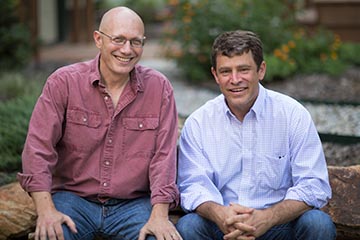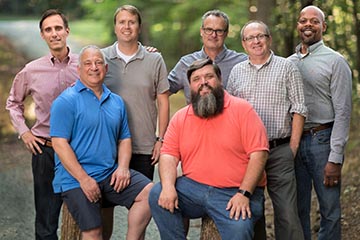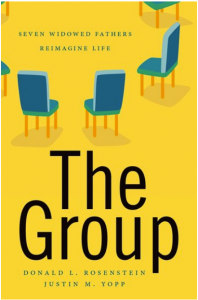Helping Widowed Fathers Move Forward with Their Children: An Interview with Author Rosenstein ’80, MD

In The Group: Seven Widowed Fathers Reimagine Life (Oxford University Press, 2018), Donald L. Rosenstein ’80, MD, and Justin M. Yopp, PhD, tell the stories of how seven men whose wives died from cancer came to terms with their grief and learned how to move forward into a meaningful future with their children. The book is based on the experiences of the men as members of a support group run by Rosenstein and Yopp at the Comprehensive Cancer Support Program at the University of North Carolina at Chapel Hill. All proceeds from the book will be donated to Rosenstein and Yopp’s clinical and research work at UNC with widowed parents. For more about the widowed parents group, visit widowedparent.org.
New York Times Personal Health columnist Jane E. Brody says about the book, “Widowed husbands with children—a double whammy—long neglected and dealt here with extraordinary sensitivity and much-needed guidance, helpful for both the men who live on and those who know and love them.”
We recently connected with Rosenstein about the the book, the group, and his path from Middletown to Chapel Hill.
Take us through your journey from psychology major at Wesleyan to founding the Comprehensive Cancer Support Program at the University of North Carolina at Chapel Hill.
In the late 1970s, Wesleyan had a strong and innovative psychology department. Since I found the psychology professors—including Bob Steele and Karl Scheibe—and coursework so interesting, I majored in psychology. I also took quite a few English literature classes and came to appreciate the value of a compelling narrative for both learning and teaching.
In my senior year, I began applying to PhD programs in clinical psychology but kept stalling when I tried to articulate my motivations to do this work. So I decided to get a job as a mental health worker at a children’s psychiatric hospital in Chicago to see if I liked working with patients as much as I liked studying mental disorders. I found that I loved doing clinical work and then debated the merits of two different pathways: clinical psychology and psychiatry. I ultimately decided that medical training with a specialty in psychiatry made more sense for me. During a 17-year career at the National Institute of Mental Health (NIMH), I developed a subspecialty focus on providing psychiatric care for medically ill patients. In 2009, I made a transition to the University of North Carolina at Chapel Hill to create the Comprehensive Cancer Support Program.

What was your impetus to start a group specifically for widowed fathers at the Comprehensive Cancer Support Program?
Most of my research and program development has been inspired by my clinical work. This is precisely how the widowed fathers group got started. In 2010, during one of our weekly clinical case conferences, a psychologist colleague of mine, Justin Yopp, reported on the death of a woman he had been working with. In providing counseling to this woman at the end of her life, Justin also came to know her husband and children. The patient’s husband was overwhelmed with his own grief, his children’s grief, and being a single parent. I wish I could say that this was a rare situation, but in our work at a busy academic cancer center, we encountered a dozen or so cases like this each year in which a parent of young children dies from cancer. We tried to refer this man to a support group for widowed fathers and were surprised to find none (either in our area or, to our knowledge, anywhere else). So we started the widowed fathers support group which has since expanded into the widowed parent program at UNC.
You started this support group with an idea of what these men needed and how the group should be structured to fulfill those needs. How did what you thought they needed compare with what they actually needed? And what were the differences?
It wasn’t even clear that the group would make it past the first meeting. What happened that first night was that seven strangers introduced themselves to each other and then each man shared his story about how his wife died. It was brutal. One devastating story after another. Justin and I tried to reassure them that subsequent meetings wouldn’t be quite so painful and hoped that they would come back the following month. They did.
Running the group was a novel experience for Justin and me. We had led other support groups and group therapy before, but this was something brand new. Our initial plan was to make the group time-limited, structured, and educational. We scheduled the group for six months and organized each session around a brief lecture (for example, about bereavement or how children understand death, etc.) to be followed by group discussion. That plan was scrapped when the men met for a second time. Even before each man had settled in around the conference table, one of the fathers announced that he had a crisis with his teenage daughter and asked for advice. They didn’t need a lecture from us. What they wanted and needed was a sense of connectedness and validation; practical problem-solving and parenting tips from each other; and a judgment-free forum to confess their “parenting failures.” The men also challenged us on our intention to make the group time-limited. We ended up meeting for nearly four years and partnering with the men in numerous ways, including the book.
 Tell us about the book, The Group: Seven Widowed Fathers Reimagine Life. When did you decide to write a book and why?
Tell us about the book, The Group: Seven Widowed Fathers Reimagine Life. When did you decide to write a book and why?
The group had been going strong for a couple of years. After a meeting one evening, Justin and I were debriefing, as we do after every session, and one of us (honestly, neither of us can remember who first suggested the idea) jokingly said that the real-life stories from these men would make a great book. We let the idea sit for a moment and then seriously considered it for the first time. At a subsequent meeting, we asked the men what they thought of the idea and every one of them encouraged us to write the book. They wanted to do whatever they could to help out other guys in their situation. They met with us outside of the group to share more insights and stories and insisted on using their real names in the book. Our overall motivation for this book was to bring attention to this particular family challenge and extend this work. All proceeds from the book will be donated to clinical and research work at UNC with widowed parents.
The Group is both informative and thoughtful. When you started writing, did you envision it as a resource for doctors and health-care professionals or was it story-based at the start, intended also for the “lay reader”?
Our ambitions for the book evolved over time. Initially, what we had in mind was a resource for widowed fathers and health-care professionals. However, the more we thought about it, the less enthusiastic we became about writing either a textbook or “self-help” book. The lessons we were learning from the men held universal appeal—hard-earned insights about all manner of serious loss and adaptation. We changed course and tried to write a book that would also resonate with a general audience. The fathers’ stories provided powerful examples of how one can reimagine a new life trajectory after a prior trajectory has been blown up.
There is an additional aspect of The Group that may not be immediately apparent: how we can improve end-of-life by learning from the bereaved. Each of these men was an eyewitness to how their wives lived with, and died from, advanced illness. It seems to us that there is so much that health care providers can learn from the lived experiences of the bereaved. Why don’t we routinely ask bereaved family members (after an appropriate time has passed) what we got right and what we could do better with respect to caring for people living with advanced disease? There is also an interesting literature that suggests that someone’s grief experience is influenced by the dying experience of their loved one. Our ongoing research is focused on trying to improve care for seriously ill patients so that we can improve care for the entire family going forward.
You talk about Elisabeth Kübler-Ross and her seminal work on death and dying as well as more contemporary studies about the grieving process. How has thinking about the topic evolved over time?
The most important thing for people to know about the grieving process is that it is not linear. Kübler-Ross’s work had a profound and positive impact on society’s capacity to talk about death and dying. Unfortunately, too many people carry with them the idea that grief and bereavement progress in a specific sequence or “staged” fashion. One of the things we hear over and over again from bereaved parents is some version of: “I still get angry or depressed . . . aren’t I supposed to be past that stage by now?”
In the book, we describe what we think is a much more compelling and “real-life” model of bereavement: The Dual Process Model (DPM) of Coping and Bereavement. This model was introduced by two psychologists from the Netherlands, Stroebe and Schut, and describes a much more dynamic way to think about how we grieve. Rather than moving from one stage to the next, the DPM takes into account the oscillation between our struggles looking backwards and coming to terms with what has been taken from us (loss) and our struggles to carry on and move forward (restoration). Most people feel that they never fully “get over” the loss of someone they loved dearly. There may be reminders and strong feelings of longing that continue for years. That is natural and doesn’t suggest pathological mourning. The experiences of the seven men in the book illustrate this point.

I know you started the group because you couldn’t find such a resource for this specific population. Is your program being used as a model for other such programs?
Whenever Justin and I speak at a professional conference about our work with widowed fathers, we are always asked two questions: 1) what about widowed mothers; and 2) is there something unique about death from cancer? In response to that first question, I’m happy to report that next month we will be starting our first widowed mothers group. Regarding the second question, there are certainly important differences with respect to the grieving process between an anticipated and a sudden death. Deaths resulting from murder or suicide will be complicated in different ways from deaths due to a medical illness or a motor vehicle accident. Nonetheless, the issues related to being a widowed parent are probably more similar than different the further the bereaved family gets from the death.
We’re hopeful that this model of caring for widowed parents will be adopted at other medical centers. We have published articles about how to start a similar group and have consulted with colleagues who are planning to start groups at other cancer centers.
How has the experience of working with this group of fathers shaped the way you work with this particular population, and others, today?
There are so many clinical “pearls.” I appreciate that some people can process a major loss and keep moving without breaking stride. However, for so many others, probably most of the rest of us, the bereavement process probably takes longer than most textbooks would suggest. So, I’ve learned to encourage patience and tolerance for a broad range of reactions to a loss. I’ve also seen firsthand that men can be emotionally available and perfectly capable of sharing painful emotional experiences with each other. In this respect, something magical can happen when people come together in a group and share an authentic experience.
Separate from these clinical insights, I now have a deeply held appreciation for the richness of partnering with patients and caregivers to improve health care. These men have been brilliant collaborators—they have reviewed and commented on our scientific manuscripts; helped us craft research surveys of widowed parents; lectured to medical student and cancer physicians; given us feedback and volunteered to be interviewed for videos and on our website; and joined us for book readings and volunteered for interviews related to this work. This has been a genuine partnership, and I’ve learned so much from these men that I’ve reshaped how I work with patients and family members.

